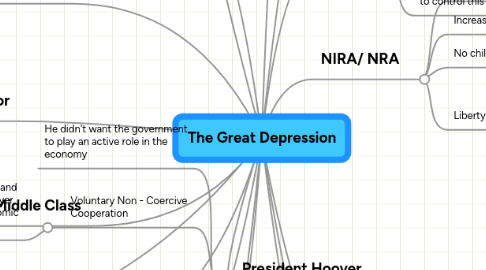
1. International
1.1. Soviet Union decreased price of wheat, so other the government can gain money.
1.1.1. Resulted in another Banker's Panic, but this became world wide
1.2. American banks gave loans to Germany
1.2.1. Caused bankrupcy
1.2.2. Americans lost their savings, since America announced bankrupcy as well
2. Before the Crash
2.1. A lot of investment in stocks
2.2. Banks were quick to give loans to investors
2.3. Buying on Margin
2.3.1. Investors only had to pay 10% of the stock's actual value during the time of purchase.
2.3.2. Balance is paid at a later time
3. Crash
3.1. The Crash happened on October 29, 1929. And lasted until 1942
3.2. Banks/ Bankers tried to sell stocks all at once and failed
3.2.1. This is called Panic Selling
3.3. Very few people were able to trade on the stock exchange
3.3.1. The economy had a ripple effect caused by the crash
4. Unemployment
4.1. Unemployment increased and the government didn't help.
4.2. Product Conductivity decrease, causing more people to lose their jobs.
4.3. With more people unemployed, the purchasing power decreased more and so did product conductivity.
4.3.1. This is The Economy Cycle
5. Poor
5.1. The poor people became even more poor
5.2. 42% of America was under the poverty line
6. Middle Class
6.1. 58% of America was people who were in the Middle Class.
6.2. People lost jobs when productivity decrease and had to cut back on purchases
6.3. The decrease in consumption affect the whole country in a bad way.
7. President Hoover
7.1. He didn't want the government to play an active role in the economy
7.2. Voluntary Non - Coercive Cooperation
7.2.1. Tax breaks for bankers/banks and businesses, but in return Hoover got a private sector for economic investment
7.3. Hoover Mortatorium
7.3.1. Hoover made an agreement to the European powers that they owned Americans money.
7.3.1.1. This helped pause the war debts and helped certain payments.
7.3.1.2. European Countries bought American goods to help the economy for Americans.
7.4. Reconstruction Finance Corporation
7.4.1. Emergency loans to banks
7.4.2. Too late
8. Tariff War
8.1. To protect the U.S. industry
8.2. The U.S. government didn't realize that this became a global economy and was not just America being affected
8.3. Productivity decreased again
9. AAA
9.1. Agrucultural Adjustment Act
9.2. Help Farmers restore their farms
9.3. Subsides- Farmers had to pay for not supplying foods.
9.3.1. Food production decreased
9.3.2. Whites were paid to work, not the blacks
9.4. Food Stamp Act
9.4.1. Gave extra foods to poor and some small farmers
10. CCC/ NYA
10.1. Civilian Conservation Corps/ National Youth Admin
10.2. 1933
10.3. Gave work to young men, ages 18-25
11. National Labour Relations Act
11.1. Outlawed anti- unions and "blacklists"
11.2. Unions and labors tactics such as collective bargaining and actions or strikes.
12. Soldiers
12.1. WW1 soldiers were not being paid by government
12.2. Soldiers walked to Washington D.C. to get Government's attention
12.3. In a year, these soldiers were dispersed by the Army
13. Franklin D. Roosevelt
13.1. The New Deal
13.1.1. Roosevelt ordered this and had the banks shut down and inspected until people's confidence in the government and banks returned, and when banks were able to invest in the economy.
13.1.2. Security Exchange Commision
13.1.2.1. The stock market reform
13.1.3. Gold Standard
13.1.3.1. Government couldn't make more money than the Fort Knox gold reserve could allow
13.1.3.2. Inflation
13.1.3.2.1. Dollar value decreased and government gained money.
14. NIRA/ NRA
14.1. National Industrial Recovery Act and National Recovery Admin
14.2. Increase industrial growth
14.3. No child labor, shortened work hours
14.4. Liberty League
14.4.1. Supreme Court overturned NIRA/NRA
14.4.2. Supreme Court claimed that the Federal government was exceeding its power
15. TVA
15.1. The Tennessee Valley Authority
15.2. nationalization v. privatization
15.3. Wanted hydroelectric power, control flooding, and private industries.
15.4. Federal government wasn't able to control this
16. Social Security Act
16.1. Creeping Socialism
16.2. Welfare State
16.2.1. unemployment insurance and old age pension
17. 1940
17.1. Election- FDR ran again
17.2. World War
17.2.1. America wanted to remain neutral
17.2.2. But also wanted to support Great Britian
17.3. Isolationist Foreign Policy
17.3.1. New Deal Legislation want this
17.3.2. FDR won election again
18. Reform
18.1. Economy
18.1.1. Government interventions with spending
18.2. America became Arsenal of Democracy
18.3. Social Reform
18.3.1. Government wasn't expected to be involved in any economic crisis.
